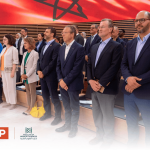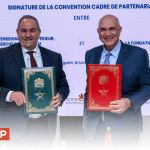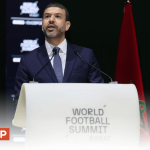JFD - SELECTED PROJECTS FROM UM6P
As part of the first cohort of the program, the EXAF centre has announced the names of the six successful teams which will take part in the Junior Faculty Development programme (JFD). Two of which, are from UM6P:
1. MACHINE LEARNING FOR ENERGY EFFICIENT INTERNET OF THINGS NETWORKS
EL-MEHDI AMHOUD
El-Mehdi Amhoud received his PhD degree in Computer and Communication Sciences from Télécom ParisTech, France, in 2017. From 2018 to 2019, he joined the CEMSE Division at KAUST University, KSA, where he was a Postdoctoral Research Fellow at the Communication Theory Lab, led by the Distinguished Professor Mohamed-Slim Alouini.
El-Mehdi is currently an Assistant Professor at Mohammed VI Polytechnic University, Morocco. His research interests include the energy efficiency and reliability of Internet of Things (IoT) networks and future generations of wireless communications.
El-Mehdi Amhoud received two awards of excellence for his PhD thesis from Mines-Télécom Institute, was awarded a Marie Skłodowska-Curie research grant from the European Commission and holds several US and Korean patents.
ANDREAS BURG
Andreas Burg joined the Integrated Systems Laboratory of the Swiss Federal Institute of Technology, in Zurich (ETHZ), from where he graduated with the Dr. sc. techn. degree in 2006. From 2006 to 2007, he held positions as postdoctoral researcher at ETHZ. In 2007 he co-founded Celestrius, an ETH-spinoff in the field of wireless communication. In January 2009, he joined ETHZ (Assistant Professor) at the Integrated Systems Laboratory. In 2011, he became a Tenure Track Assistant Professor at EPFL where he is leading the Telecommunications Circuits Laboratory in the School of Engineering. Since 2018 he is a Tenured Associate Professor at EPFL.
In 2000, Andreas Burg received the Willi Studer Award and the ETH Medal for his diploma. He was also awarded an ETH Medal for his Ph.D. dissertation in 2006. He is a member of the Institute of Electrical and Electronics Engineers (IEEE) and of the European Association for Signal Processing (EURASIP).
ABOUT THE PROJECT
This project is in the field of information technology and aims to develop Internet of Things solutions to address a number of challenges faced by African countries, such as drought and traffic jam in urban areas. This research team will contribute to the application of the most recent techniques in Africa, such as smart farming and self-driving vehicles.
SUMMARY
This research project focuses on networks composed of ground Internet-of-Things (IoT) devices connected to flying drones. Connected IoT devices are expected to provide reliable and real-time communication for several applications such as smart farming, self-driving cars, and robotics. Besides, drones can provide cost-effective wireless communication solution when used as flying aerial base stations or gateways. Drones can be rapidly deployed to collect data from IoT devices, improve their connectivity and coverage, as well as provide them with wireless power.
The aim of this project is to investigate and demonstrate high capacity drones-assisted IoT networks with low energy consumption and highly secure communication. For this, efficient machine learning (ML) based algorithms for the maximisation of the capacity of IoT networks will be developed and demonstrated. At the same time, to alleviate the battery issue, intelligent methods for energy harvesting and power control will be developed. Moreover, the robustness capabilities of IoT networks to maintain high security levels against different kind of attacks and vulnerabilities will be investigated. Finally, we aim to bring these developments to fruition and enable their early exploitation by showing how to integrate them with the latest emerging IoT standards as shown in proof-of-concept demonstrators.
2. THE DESIGN OF REACTIVE, SPONGE-LIKE MATERIALS FOR THE PRODUCTION OF CHEMICALS AND FUELS FROM CO2
SAMIR EL HANKARI
Samir El Hankari received his PhD degree in the synthesis of nanostructured silica hybrid materials in 2012 from the University of Montpellier 2 (France). He then joined four different teams as a post-doc researcher in United Kingdom, Morocco, China and Austria.
He has experience in organic synthesis and materials science, particularly: i) sol-gel, ii) nanostructured porous silica bearing organo-ionic species, iii) templating and processing of mesoporous Metal-organic frameworks (MOFs), MOF capsules and MOF@oxide composites and evaluating their practical application in catalysis, sensing and adsorption. Recently, his experience has been extended to the Sol-gel of MOFs, bio-polymer@MOFs and ceramic@MOFs composites as well as their shaping into membranes, films and monoliths.
Since September 2019, Samir joined Mohammed VI Polytechnic University in Chemical & Biochemical Science (CBS) department as an Assistant Professor in inorganic chemistry – hybrid materials with major interests on the development of sustainable synthesis, and processing of porous organic-inorganic materials such as MOFs and their composites as well as porous silica hybrid materials for the adsorption, sensing, and (photo)catalysis.
WENDY L. QUEEN
Wendy L. Queen obtained her PhD in chemistry from Clemson University (August 2009). Her dissertation was focused on the synthesis and characterization of extended solids that contain low-dimensional magnetic nanostructures. Upon receipt of her PhD, she was awarded a fellowship from the National Research Council to study neutron scattering at the NIST Center for Neutron Research in Gaithersburg MD. Here she chose to focus her work on elucidating small molecule interactions on the internal surface of porous adsorbent materials, such as metal-organic frameworks and zeolites.
In 2012, she was appointed a project scientist position at the Molecular Foundry at Lawrence Berkeley National Laboratory in Berkeley CA where she helped launch a new user program focused on the synthesis and characterization of porous adsorbents. In 2015, she was appointed Assistant Professor in the Institute of Chemical Sciences and Engineering at EPFL. Her research is currently focused on the synthesis and characterization of novel porous adsorbents, namely metal-organic frameworks, that are of interest in a number of host-guest applications.
The ultimate goal of her research is to contribute knowledge towards solving globally relevant problems, like reducing energy consumption, developing sustainable processes, cutting CO2 emissions, and water purification. Her desire is to help train a new generation of researchers that have the knowledge and scientific skill set necessary to become future frontrunners in energy and environmentally-related research.
ABOUT THE PROJECT
Metal-organic frameworks (MOF) are a class of highly porous, sponge-like materials that have diverse applications, such as water purification, gas storage and separations, and catalysis. This research team sees a bigger picture: they will design reactive MOFs that can capture CO2 from gas mixtures and subsequently transform this greenhouse gas into value-added products.
SUMMARY
Since El Hankari’s arrival at UM6P, his main interest has been the design and synthesis of new porous hybrid materials. His particular focus is on the development of sustainable approaches for the fabrication of Metal-organic frameworks (MOFs) and MOF composites to target applied research in water cleaning, catalysis, sensing and meanwhile solve some of issues encountered in phosphate industry. In this context, Samir was delighted to receive an EXAF grant within the frame of the JFD programme to work in close collaboration with Prof. Wendy Lee Queen from the Institute of Chemical Sciences and Engineering at EPFL.
Our project focuses on the design and development of new MOFs and MOF composites for the implementation of new catalytic technology-based MOF in CO2 conversion, which consists of constructing new bi- or multi-functional MOF catalysts. These catalysts contain different sites to simultaneously reduce CO2 emission and provide new source of energy by converting CO2 to value added product, which has relevance to environment and energy.
_1.png)






